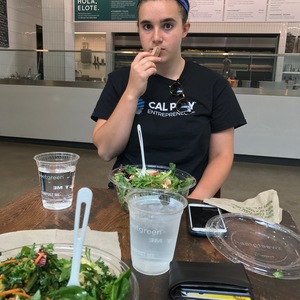Just a week ago, I went to brunch with a group of friends fully intending to eat 80% of my food for that day in one sitting. Half a slice of carrot cake, a few nibbles of the largest chocolate chip pancakes I’ve ever seen, two fried green tomato slices, and a hefty portion of shrimp and grits, I had fully succeeded in my mission. However, I had eaten myself into a state of complete submission.
We’ve all been there: five, six, maybe seven slices of pizza in and you’re about to hit “the wall.” You know that the minute you see a couch, a bed, or even a floor, that you’ll fall asleep for hours. This blissful slumber is known as a food coma, or more scientifically speaking the postprandial somnolence. Since it is my favorite stage of sleep, I decided to learn the true science behind it.
Fly Simulation Study
A group of scientists used fruit flies (aka drosophilia) to simulate the potential causes of food comas to track the impact. The results from this study in a generalized sense were that sleep probability of the flies increased as a function of the meal size. That is, the bigger the meal, the more likely they were to sleep afterward.
The scientists also found that high salt-content foods had the potential to impact the sleep-wake cycle because they can increase chemicals in the brain which control the cycle. Interestingly, sucrose (a type of sugar) was not shown to have a role in the food coma of these fruit flies.
Bloodflow Hormone Theory

There is a theory which explains food comas based on the trajectory of blood flow in the body. As many know, blood helps deliver oxygen to various regions of the body which is essential to avoiding fatigue, and having enough energy to follow through with specific biological processes.
When we eat food, it travels through our small intestine and gut, triggering a hormone release that essentially asks the body for more blood flow to that region so that the work of digesting food can be powered. This diversion of blood flow may cause less blood flow to the brain or other areas of the body that are expressed as fatigue.

The body also slows the heart rate to increase digestion so this could be another explanation as to why individuals feel more fatigued after a meal. The larger the meal, the more distention within the stomach that triggers blood flow shifts, thus the more tired one may feel. More evidence to corroborate this theory is that being mildly active (aka going for a light walk) might help one to avoid a food coma because it promotes blood flow control throughout the body.
Preventing Food Coma

If you are someone who is trying to prevent the occurrence of this peaceful slumber, there are many steps you can take. As mentioned before, being lightly active after a meal can help avoid the food coma. In addition, by eating in moderation and pacing the meal over a period of time, the body will be better equipped to handle the digestion process. Take time to enjoy your meal, not just scarfing down something between study sessions. Finally, having the correct balance of macronutrients (carbs, proteins, and fats) on your plate can help to avoid postprandial somnolence. Smaller amounts of proteins and fats, with a moderate amount of carbs will allow for the avoidance of fatigue, while still fulfilling the necessary components that the body requires.

All in all, food comas are real, people, and they are great. If you’re like me, then you will happily participate in this activity when the time warrants it and according to science, you won’t be alone. Should you be a responsible meal-goer and want to avoid the food coma, now you know how. Whether it be due to hormones, or blood flow throughout the body, postprandial somnolence is a real occurrence in our bodies and it’s time that we learn about it.



